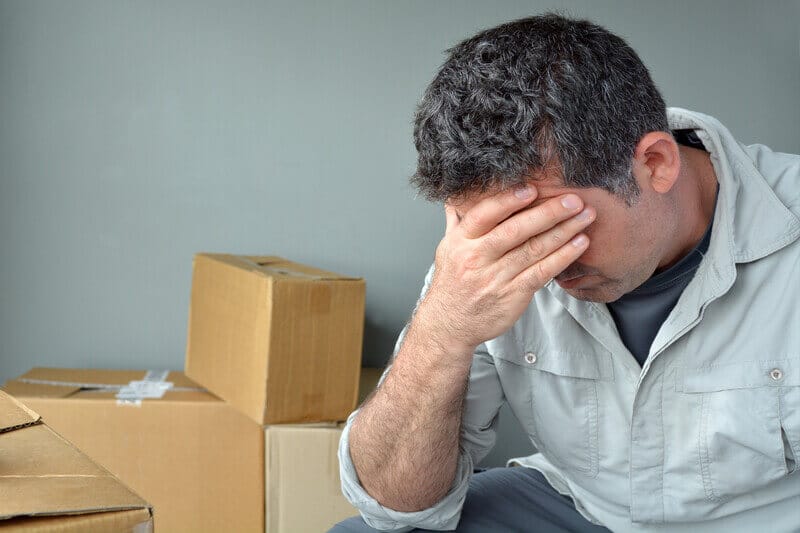Moving Can Be A Stressful Process
Moving can be an exciting yet stressful process for everyone invovled, and unfortunately, it’s not that uncommon for items to go missing or get damaged during the process. If you book with Pricing Van Lines these rates drastically improve.
If you didn’t book with us and are encountering this frustrating situation, here’s a personalized guide on what steps to take to help you get what you deserve.
1. Stay Calm and Assess the Situation With Eae
The first step is to take a deep breath and assess what’s actually missing or damaged. Before you panic which won’t help anything, check the following:
- Personalized Inventory List: If you created a personalized nventory list as we always recommend to our clients before your move, refer to it now to determine what’s missing or damaged. If you have photos or video evidence this is even better. This list and photos will be crucial for claims.
- Check All Boxes: Sometimes, items may be packed in unexpected boxes. Packing is stressful it could just be that you misplaced your own items from lack of sleep. Take the time to thoroughly check all your belongings before starting a claim.
2. Document Everything
Once you’ve identified which are the lost or damaged items, documentation is key to getting your money or items back:
- Photograph Damaged Items: Take clear photos of any damaged belongings from all angles. This visual evidence will be essential when filing a claim to prove you aren’t just trying to take advantage of the insurance.
- List Lost and Damaged Items Out: Create a detailed list that includes descriptions, estimated values, and any relevant information (like when you last saw the item). If you have receipts for the items from when purchased this is the best form of proof so check your email for these receipts.
3. Contact Your Moving Company ASAP
Reach out to your moving company as soon as possible:
- Report the Issue: Inform them of the lost or damaged items. Most companies have specific protocols for handling claims and a certain time frame in which you can submit claims post move.
- Ask About Their Claims Process: Ask them about the steps you need to follow to file a claim. Understand what documents they need and the timeframe for filing. Make sure you understand all the fine print or call back.
4. Review Your Moving Contract
Your contract with the moving company will outline their liability policies and claims process and overall give you an idea of your rights:
- Understand Coverage Options: Determine if you opted for full-value protection or lower-value protection. This will affect the compensation you will receive for lost or damaged items. Know what deductibles you are responsible for to understand if it is financially viable to submit the claim.
- Know Your Rights: Familiarize yourself with the moving company’s responsibilities and your rights as a customer.
5. File The Formal Claim
Once you have all your papers in roder, it’s time to file the actual claim:
- Complete Necessary Forms: Fill out any required forms provided by your moving company. Be thorough and include all supporting documentation, such as your inventory list, photographs, and receipts if available.
- Submit Claim Promptly: Ensure you submit your claim within the specified timeframe, which is often within 9 months of your move.
6. Follow Up Regularly
After submitting your claim, stay proactive and don’t let them drop the ball:
- Check the Status of Your Claim: Regularly follow up with your moving company to ask about the status of your claim. Keep records of all communications with them. This easy if they delay things you can sue.
Be Patient but Firm: Claims can take time to process, but don’t hesitate to ask for updates or tell them your concerns if you haven’t heard back in a reasonable time frame..
7. Consider Insurance Options
If you find that your moving company’s coverage is insufficient before the move, consider additional insurance options:
- Homeowners or Renters Insurance: Check if your policy covers moving-related damages. Some policies may extend coverage to items in transit.
- Third-Party Moving Insurance: Research third-party moving insurance providers for added protection during your move.
- Other: Look into any other insurance claims you might be able to file via your credit cards or other vehicles.
8. Learn from the Experience
Once the situation is resolved, take the opportunity to learn from the experience/ Life gives us lemons so that we can learn to make lemonade so don’t miss your chance:
- Reevaluate Your Moving Company: If your claim process was difficult or unsatisfactory, consider researching other moving companies for future moves. Make sure the experience is written on their google maps reviews so that you can save others from the bad experience.
- Improve Packing Techniques: Look into your packing techniques. Investing in higher-quality packing materials or hiring professional packers can minimize the risk of damaged items in future moves.
Wrapping Up What Is Left
Experiencing lost or damaged items during a move is simply frustrating, scary and unplease. Knowing how to address the situation calmly after a few deep breaths can help ease the stress.
By staying organized, documenting everything with photos, and following the right steps, you can navigate the claims process more effectively and keep following up.
While it’s an unfortunate part of moving, being prepared and proactive can make a significant difference in recovering your belongings or receiving their value in cash.
Frequently Asked Questions
How do I start creating my own moving inventory list?
Pick up a pen and paper (or your iPhone) and begin. Start with the big items and work your way through to the small household items in every room.
Keep a tally and write everything down along with photo evidence. Count the number of beds, bed frames, tvs, and so on so that you can hold your mover accountable and know what you have to work with.
What is the best way to keep my items safe?
The truly important pieces I would recommend actually packing up in many layers of bubble wrap and towels and actually putting in your personal car if the option exists.
You can of course wrap these items and put them in a plastic bin with many layers of pillows, towels and more soft items and write “fragile” on top, but I think it’s better to play it safe than sorry.
How can I remain calm during my move?
When you book with Pricing Van Lines, you know you are taking a step in the right direction to keep your move calm, cool, and collected. When you are proactive about all the many tasks that need to be done, it is easier to keep calm.
Keeping a list and organizing it by priority items to finish and giving due dates for each line item can be a good way to feel in control of the move rather than it is controlling you.
ֿWhat is the smartest way to book a moving company that is trusted?
Pricing Van Lines is clearly the right answer to this question. If it’s te quality you want without a hefty price tag, there is no competition in the market. You should book with our pro teams to lock down affordable rates for the dates you need. Don’t worry the entire moving plan is fully custom built.
What is the worst thing that can happen during a move?
The worst thing would be your mover bailing on you the morning of your move. It happens all the time in the industry. Booking a scammer is the worst thing that can happen.
They can take a huge deposit up front and then just never show up or give a lame excuse and not answer your calls. This can be avoided by booking online with Pricing Van Lines. Don’t get hit by hidden fees or scammed.




